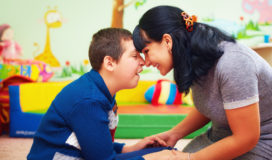In today’s modern society, inclusivity is regarded as a necessity and, more often, a commodity, especially in mainstream media. More than just representation in the media, individuals with Down Syndrome have become achievers in their own right and in their chosen industry.
Without a doubt, we have come a long way since the time Down Syndrome was highly-stigmatized and patronized by society. Today, countless treatments and therapies are available so that individuals with Down Syndrome can have the best quality of life and live up to their full potential. These include speech and language therapy, occupational therapy, and Applied Behavioral Analysis (ABA) Therapy.
Despite this, specialists are continuously looking for ways to improve the existing treatments and therapies known today. Let’s take a look at the intellectual challenges that children with Down Syndrome experience.
What Are Intellectual Disabilities?
Individuals who experience intellectual disabilities face challenges when processing information, reasoning, problem-solving, and communication. This affects a person’s daily practical and social abilities. Adaptive behavior and intellectual functioning are two measures to assess an individual’s intellectual ability. It can be linked to a genetic condition, a present health problem, or external factors such as the environment.
Down Syndrome and Cognitive Ability
Down Syndrome is one of the most common causes of intellectual disabilities in children. According to research, 15 to 20 percent of individuals who have mild to moderate intellectual disabilities have Down Syndrome. Children with Down Syndrome may experience challenges both in the intellectual and developmental aspects of their childhood. This can also include a shorter attention span, impulsive behavior, relatively slow learning, and difficulties in speech and language. It is important to know, however, that Down Syndrome is rarely associated with a severe cognitive disability.
Communication Ability
Children with Down Syndrome also experience communication challenges. While it is true that most Down Syndrome children develop their communication skills later than their neurotypical peers, early interventions such as speech and language therapy can reinforce their speech development from a young age. These treatments are helpful in encouraging them to be expressive and improve their communication ability as a whole.
Social Interaction
Social interaction in kids with Down Syndrome can be highly affected by intellectual disability. This is evident in how they communicate, interpret messages, learn information, and interact with their peers. Other Down Syndrome children may have delayed speech and language development, which impairs their social interaction skills. Without the right treatment for a child’s intellectual disability, they can grow up to become adults who are susceptible to stressful social interactions.
Early Intervention
To improve a Down Syndrome child’s development and intellectual abilities, early intervention is essential. It will prevent Down Syndrome children from experiencing stagnation at any point in their development. This also gives them an opportunity to grow up as functioning individuals who can take up roles as an adult in society.
Final Words
Specialists can provide the right tools and proper resources to aid in your child’s intellectual development. Treatments such as occupational therapy, ABA therapy, and Speech and Language therapy are best done during the early stages of their childhood.
If you wish to learn more about the possible treatments that can help your child with Down Syndrome, talk to our experts at Pulse Center today.






